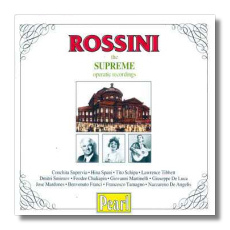
The Internet's Premier Classical Music Source
Related Links
- Rossini Reviews
- Latest Reviews
- More Reviews
-
By Composer
-
Collections
DVD & Blu-ray
Books
Concert Reviews
Articles/Interviews
Software
Audio
Search Amazon
Recommended Links
Site News
 CD Review
CD Review
Gioachino Rossini

The Supreme Operatic Recordings
17 Arias and scenes from:
- The Barber of Seville
- William Tell
- L'Italiana in Algeri
- Mosè in Egitto
- La Cenerentola
Hina Spani, soprano
Conchita Supervia, mezzo-soprano
Tito Schipa, Dmitri Smirnov, Giovanni Martinelli, Francesco Tamagno, tenors
Lawrence Tibbett, Giuseppe de Luca, Benvenuto Franci, baritones
Marcel Journet, José Mardones, Feodor Chaliapin, Nazzareno de Angelis, basses
Various piano and orchestral accompaniments
Pearl GEM0088 ADD monaural 77:32
- The Barber of Seville
- William Tell
- L'Italiana in Algeri
- Mosè in Egitto
- La Cenerentola
Conchita Supervia, mezzo-soprano
Tito Schipa, Dmitri Smirnov, Giovanni Martinelli, Francesco Tamagno, tenors
Lawrence Tibbett, Giuseppe de Luca, Benvenuto Franci, baritones
Marcel Journet, José Mardones, Feodor Chaliapin, Nazzareno de Angelis, basses
Various piano and orchestral accompaniments
Pearl GEM0088 ADD monaural 77:32
Here's yet another compilation produced in collaboration with The Record Collector, an English publication edited by Larry Lustig and "the only journal dedicated to the great singers of the past." I previously reviewed similar discs containing music by Verdi and Donizetti, and other operatic collections also are available, or will be shortly. It is not reasonable to expect a single 77-minute disc to include all the worthwhile 78-rpm recordings of any great operatic composer's music. What this and other "Supreme Operatic Recordings" collections have to offer is a well-chosen and varied program. All the work has been done for us, so there's no need to sharpen cactus needles or pull piles of compact discs off of the groaning shelves.
Five of these recordings display the work of Spanish mezzo-soprano Conchita Supervia (1895-1936), the Cecilia Bartoli of her era. Bizet's Carmen and Rossini were her specialties, and specifically the latter composer's comic roles. The recordings included here are not unusual on CD, but Roger Beardsley, who produced this CD and effected the transfers, has opened them up and made them sound fresh. Supervia's distinctive vibrato (it has been compared to the rattling of dice) is not troublesome, her runs are awesomely even, and her pitch and tone are secure from top to bottom. Best of all, the lady had the sense of humor required to make the strong-willed heroines from The Barber of Seville, L'Italiana in Algeri, and La Cenerentola leap to life. All five recordings were made for the Odeon label in 1928. The other woman on this CD is the Argentinean Hina Spani, whose expressive "Selva opaca" from William Tell reminded me of the singing of Montserrat Caballè.
Franci and De Angelis deserve special mention because they are more obscure. The latter was born in 1891, and was active in Europe and South America between the two World Wars. His "Resta immobile" from William Tell is a lesson in legato singing. De Angelis, born in 1881, was an imposing bass. Italian revivals of Mosè in Egitto were mounted specifically for him, and the two scenes recorded here ("Dal tuo stellato soglio" and "Eterno, immenso, incomprensibil Dio!") have been instrumental in keeping that opera from sliding into oblivion.
Most of the other singers on this CD are predictably delightful. Martinelli's heroic tone is put to excellent use in three scenes from William Tell, and the acoustic recording does nothing to limit the power of his singing, nor the mellifluous blend of his voice with the lower voices of Journet, or of Mardones and De Luca. Schipa's "Ecco ridente in cielo" is a stylistic paragon; Tibbett's "Largo al factotum" is far more free-wheeling, but his high spirits and generous singing are hard to resist.
The weakest recordings on the disc come from other tenors; each had his excuse, however. Francesco Tamago was near the end of his career in 1903, and his "Corriam, corriamo!" from William Tell is badly underpowered – hardly a battle cry! The other culprit is the Russian Dmitri Smirnov, but only because he lacks the requisite grace and respect for the music; his "Se il mio nome saper" finds him using his attractive voice too self-indulgently.
As mentioned above, the transfers are by Roger Beardsley, and he used uniformly good copies of the original discs. Surface noise is present but never obtrusive.
Copyright © 2000, Raymond Tuttle


















